Introduction
Staying ahead of the game is essential in the ever-evolving digital marketing landscape.
One of the latest innovations that has been transforming the way we create, distribute, and optimize content is Artificial Intelligence (AI).
Gone are the days when content marketing was solely a manual, time-consuming effort. Today, AI-driven content marketing is revolutionizing the industry, making it more efficient and effective. For example, AI tools can analyze user behavior to suggest topic ideas or automatically generate drafts that match audience intent, saving hours of research and writing time.
In this guide, we will delve into the world of AI content marketing, demystifying its applications, benefits, and the steps you can take to harness its full potential.
Whether you're a seasoned marketer looking to boost your strategies or a newcomer eager to understand the latest trends, this comprehensive exploration of AI content marketing will equip you with the knowledge and tools you need to excel in the digital age.
Let's embark on this journey to unlock the secrets of AI-driven content marketing and its potential to propel your brand to the top of search engine rankings.
What Has AI Got to Do with Content Marketing?
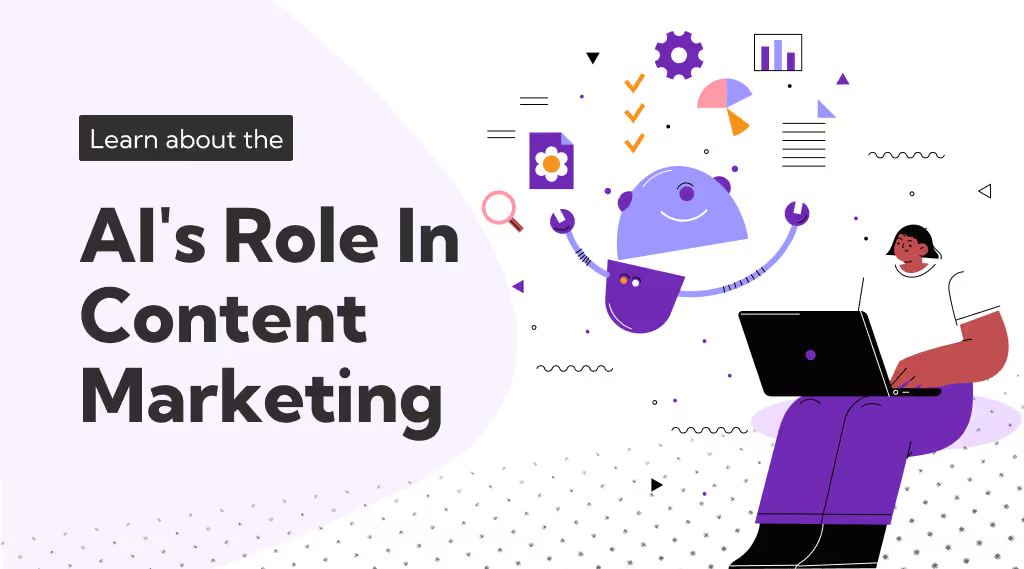
Artificial Intelligence (AI) has rapidly become a game-changer in creative content marketing. Its integration into content marketing strategies is nothing short of revolutionary. Let's explore how AI is reshaping the content marketing landscape:
1. Content Creation and Generation:
AI-powered tools can create high-quality content, from articles to product descriptions, at an unprecedented speed. These tools analyze data, understand the target audience, and generate content that is both engaging and relevant. Content generation platforms use Natural Language Processing (NLP) algorithms to create human-like content, saving time and resources for marketers.https://revvgrowth.com/saas-seo/advanced-keyword-research/
2. Content Personalization:
AI algorithms analyze user behavior and preferences to deliver personalized content recommendations. This enhances user engagement and satisfaction Personalized content increases the likelihood of conversions, as it speaks directly to the individual's interests and needs.
3. SEO and Content Optimization:
AI-driven SEO tools help content creators optimize their material for search engines. They suggest keywords, structure, and formatting to enhance search visibility.AI can analyze the performance of content and provide insights for improvement, including adjustments to meta tags, headings, and content length.
4. Content Distribution and Marketing:
AI streamlines content distribution by automating the process across various channels. It can schedule social media posts, send personalized emails, and target the right audience at the right time.AI-driven marketing automation allows for better segmentation and targeting, improving the overall effectiveness of marketing campaigns.
5. Data Analysis and Insights:
AI can analyze vast datasets to extract valuable insights about user behaviour, content performance, and market trends. These insights can inform content strategies and help identify areas for improvement. Predictive analytics powered by AI can forecast future trends and user behavior, enabling marketers to stay ahead of the competition.
6. Chatbots and Customer Support:
AI-driven chatbots offer 24/7 customer support, answering queries and resolving issues promptly. This enhances user experience and frees up resources for more strategic tasks. Chatbots can engage with users in natural, conversational language, providing a personalized experience.AI is a vital component of content marketing today. It can create, optimize, and distribute content efficiently while providing valuable insights to refine strategies. Its ability to personalize content and engage with audiences on a deeper level makes it a powerful tool for enhancing user experiences and driving conversions. In the following sections, we will explore these aspects of AI in content marketing in greater detail, offering practical insights and strategies to leverage its capabilities effectively.
10 AI Content Marketing Benefits You Should Know
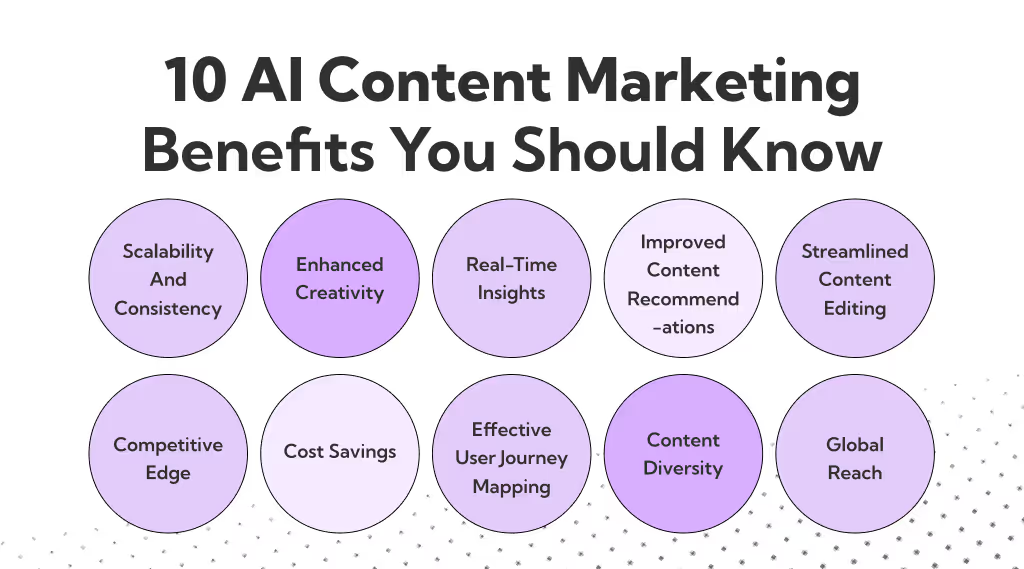
Infusing Artificial Intelligence (AI) into content marketing strategies provides a range of substantial advantages. Let's delve deeper into each of these benefits for a more precise understanding:
- Scalability and Consistency: AI enables the creation of large volumes of content quickly, ensuring a consistent output in style and tone. This scalability allows marketers to cater to a broader audience and maintain a uniform brand voice.
- Enhanced Creativity: AI can inspire creativity by generating novel ideas or content concepts based on user inputs. Marketers can leverage AI to spark new and innovative content ideas.
- Real-time Insights: AI-powered analytics provide real-time insights into content performance. This allows marketers to adapt strategies and content on the fly, responding to their audience's changing needs and interests.
- Improved Content Recommendations: AI-driven recommendation engines analyze user behavior and preferences, making personalized content recommendations more accurate. This increases user engagement and the likelihood of conversions.
- Streamlined Content Editing: AI tools can assist in content editing, suggesting improvements in grammar, style, and structure. This speeds up the editing process and enhances content quality.
- Competitive Edge: Marketers who harness AI can gain a competitive edge by staying ahead in the ever-evolving digital landscape. AI helps in predicting trends and aligning content strategies with emerging market developments.
- Cost Savings: AI can significantly reduce operational costs by automating various content-related tasks. Fewer human resources are required for repetitive activities, leading to cost savings.
- Effective User Journey Mapping: AI allows for creating detailed user personas and journey maps. Marketers can use this information to craft content that effectively guides users through the conversion funnel.
- Content Diversity: AI can generate content in various formats, such as articles, videos, infographics, and more. This diversity caters to different audience preferences and consumption habits.
- Global Reach: AI-powered translation and localization tools make adapting and translating content for a global audience easier. This ensures that your content can reach and engage with international markets effectively.
These unique benefits illustrate how AI transforms content marketing, offering efficiency, effectiveness, and innovative opportunities for marketers to engage their audience and drive results. Understanding the depth of these comprehensive benefits is pivotal in today's digital landscape. AI not only enhances the quality of your content but also personalizes it, optimizes it for search engines, and provides efficiency gains that can lead to cost savings.In the following sections, we will provide actionable insights and strategies to effectively harness AI for your content marketing endeavors, helping you stay competitive in the digital age.
AI Content Marketing Objectives You Should Be Aware Of
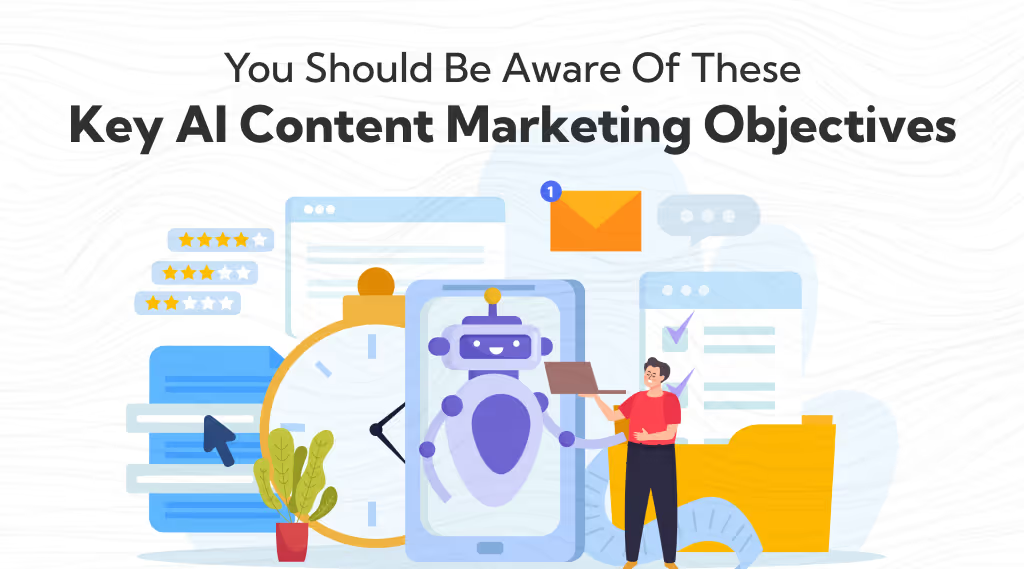
Incorporating Artificial Intelligence (AI) into your content marketing strategy requires a set of well-defined objectives to ensure your efforts are purposeful and results-driven. Here's an in-depth exploration of these critical objectives:
- Enhanced User Engagement: AI-driven content aims to captivate and retain user interest. Through personalized content recommendations and real-time adjustments, the objective is to keep users engaged, resulting in longer session durations and more interaction with your brand.
- Dynamic Content Generation: Dynamic content is responsive to user behavior and preferences. AI enables the creation of content that adapts in real time, ensuring that users always encounter fresh, relevant, and personalized content tailored to their evolving needs.
- Improved Content Promotion: AI data analysis helps identify the most effective distribution channels and optimal posting times. The goal is to deliver content when and where it's most likely to reach the right audience, maximizing exposure and engagement.
- Audience Expansion: AI can identify and target new audience segments based on data insights. This objective involves using AI to broaden your content's reach, reaching untapped markets or demographics and fostering growth.
- Content Localization: AI can adapt content for diverse geographic regions and languages. The objective is to make content more relevant and accessible to a global audience, respecting linguistic and cultural nuances.
- Content Governance and Compliance: In regulated industries, AI can ensure content complies with industry-specific regulations and guidelines. The objective here is to maintain content integrity and adherence to legal standards.
- Conversion Rate Optimization: AI-optimized content aims to persuade and compel users to take action, enhancing conversion rates. This objective is crafting content that efficiently guides users through the conversion funnel.
- Improved Customer Support: AI-generated content can provide instant answers to customer inquiries and improve customer support efficiency. The goal is to enhance user experiences and streamline support processes.
- Content Adaptation for Emerging Technologies: As new technologies and platforms evolve, AI ensures content is adapted and optimized for these channels. Whether it's optimizing content for voice assistants, AR/VR experiences, or emerging social media platforms, the objective is to stay ahead of technological trends.
- Ethical AI Use: Ensuring that AI-driven content marketing adheres to ethical guidelines is paramount. This objective revolves around maintaining user privacy, avoiding content that may be harmful or inappropriate, and using AI responsibly and ethically.
These comprehensive objectives showcase the versatile applications of AI in content marketing, offering a wide array of strategies to enhance user experiences, expand reach, and meet regulatory and ethical standards. These in-depth objectives serve as a roadmap for leveraging AI in content marketing to achieve a comprehensive range of benefits, from content quality and efficiency gains to cost savings and predictive insights. By clearly understanding these objectives, you can effectively harness AI's capabilities to stay competitive and ahead in the dynamic digital landscape.
How Do We Use AI to Generate Content?
Artificial Intelligence (AI) can be a powerful tool for content generation. Here's a step-by-step guide on how to use AI for content creation effectively:
1. Define Your Content Goals:
Start by outlining your content marketing objectives. Define the type of content you need (blog posts, product descriptions, social media updates, etc.), and specify your target audience. Knowing your goals will guide your content creation strategy.
2. Select an AI-Powered Content Generation Tool:
Various AI content generation tools are available, each with unique features and capabilities. Research these options and select one that aligns with your specific needs. Popular choices include GPT-3, BERT, and content generation platforms like Clearscope, SurferSEO, or CopyAI.
3. Input Guidelines and Topics:
Provide detailed instructions to the AI tool. Specify the tone, style, and format you desire. If you're generating content on a specific topic, provide background information, keywords, and context to guide the AI in generating relevant content.
4. Review and Edit AI-Generated Content:
AI-generated content is a starting point. Review it carefully for accuracy, relevance, and coherence. Ensure it aligns with your brand's voice and messaging. Make edits as needed to fine-tune the content to your standards.
5. Add a Human Touch:
AI-generated content can sometimes lack depth and personalization. Inject a human touch by incorporating personal insights, examples, and stories. This makes the content more engaging and adds a unique perspective that AI may not provide.
6. Conduct Plagiarism Checks:
Always use plagiarism detection tools to verify the originality of AI-generated content. Ensure it's free from plagiarism to avoid legal issues and maintain ethical content creation practices.
7. Optimize for SEO:
While AI can assist in keyword selection, optimizing the content for search engines is essential. This involves proper keyword usage, optimizing meta tags, using headers effectively, and including high-quality links. AI tools can help identify relevant keywords, but human input is often necessary to craft content that ranks well in search engines.
8. Test and Iterate:
It's crucial to continuously test the performance of AI-generated content against content produced by human writers. Analyze which type of content resonates more with your audience and iterate your approach accordingly. It's often a blend of AI and human-created content that works best.
9. Engage in Quality Control:
Implement a comprehensive quality control process. This may involve human proofreading, editing for grammar and style, and ensuring the content maintains a consistent brand voice. Quality control helps to maintain content standards and professionalism.
10. Monitor Analytics and User Feedback:
After publishing AI-generated content, track its performance using analytics tools. Measure metrics like engagement, click-through rates, and conversions. Additionally, pay attention to user feedback through comments and social media interactions. Use these insights to adapt and refine your content strategy.
11. Keep Abreast of AI Advances:
AI technology is continually evolving. Stay informed about the latest developments and improvements in AI content generation. This ensures you always use the most advanced and effective tools available. The key to successful content creation using AI is to strike a balance between automation and human creativity. AI can significantly streamline the content generation process, but the human touch often adds depth, authenticity, and a unique perspective to your content. By following these steps and continually refining your approach, you can harness AI's capabilities for more efficient and compelling content creation.
7 Best AI Content Writing and Marketing Tools to Watch out For
Several AI content writing and marketing tools available today can significantly enhance your content creation and marketing efforts. Here are seven of the best AI tools to watch out for
- GPT-3 (OpenAI): GPT-3, "Generative Pre-trained Transformer 3," is one of the most advanced AI language models. It can generate human-like text and has been integrated into various content-generation platforms. It's a versatile tool for creating articles, social media posts, and more.
- Clearscope: Clearscope uses AI to analyze top-ranking content for a given keyword and provides content optimization recommendations. It helps content creators improve their articles and ensures they cover all relevant topics.
- SurferSEO: SurferSEO uses AI to analyze top-ranking pages for a target keyword and provides recommendations for on-page optimization. It's beneficial for SEO-driven content creation.
- CopyAI: CopyAI is an AI-powered content generation tool that can create blog posts, product descriptions, social media content, and more. It's known for its versatility and ease of use.
- Jarvis by ConversionAI: Jarvis is an AI tool that generates human-like text for various content types, including blog posts, marketing copy, and social media posts. It also offers a long-form assistant for creating in-depth content.
- Quill by Narrative Science: Quill uses AI to generate narrative-style reports, insights, and content. It benefits data-driven content generation, such as financial reports and business analytics.
- Wordtune: Wordtune is an AI-powered writing assistant that provides suggestions to improve the clarity, tone, and style of your writing. It helps you craft more compelling and reader-friendly content.
- Keep in mind that while AI tools can be beneficial, they should be used as a complement to human creativity and expertise. The best content often results from AI-generated drafts and human editing and customization. As these tools continue to evolve, they can significantly enhance your content marketing efforts, saving time and improving content quality.
AI Content Marketing Strategies to Try in 2024
AI content marketing strategies continue to evolve, and staying ahead of the curve is crucial. Here are several AI content marketing strategies to consider in 2024:
- AI-Powered Content Personalization: Use AI to analyze user data and behavior to deliver highly personalized content experiences. This could involve dynamic website content blocks, personalized email campaigns, and product recommendations based on individual preferences.
- AI-Generated Visual Content: AI is increasingly proficient at generating visual content like images, videos, and infographics. Explore AI tools for creating visual assets that complement your written content, making it more engaging and shareable.
- Content Optimization with AI: Utilize AI tools to optimize existing content for search engines and user engagement. AI can analyze performance data and suggest improvements to boost rankings and user interactions.
- Chatbots and AI-Powered Conversational Marketing: Implement AI chatbots for real-time customer support, lead qualification, and personalized interactions. These bots can engage with website visitors and answer common questions, enhancing user experiences.
- Predictive Analytics for Content Planning: Leverage AI's predictive capabilities to forecast content trends and user behavior. Use this insight to plan content that aligns with upcoming trends and market shifts.
- Voice Search Optimization: As voice search grows, optimize your content for voice search queries. AI can help identify long-tail keywords and conversational content that aligns with how people speak to voice assistants like Siri and Alexa.
- AI-Enhanced Content Audits: Use AI to conduct in-depth content audits, identifying content gaps, outdated material, and areas for improvement. This ensures that your content remains relevant and high-performing.
- Content Distribution with AI: Automate content distribution across various platforms, schedule posts, and tailor content for specific channels and demographics. AI can also assist in audience segmentation for more targeted distribution.
- AI-Generated Content for Data-Driven Industries: In data-driven industries like finance and analytics, consider using AI to generate reports, summaries, and insights based on data analysis. AI can save time and ensure accuracy in reporting.
- A/B Testing and AI-Driven Optimization: Continuously test and optimize content using AI. These tools can rapidly conduct A/B tests, analyze performance, and make data-driven recommendations for content improvements.
- AI-Enhanced Content Creation Tools: Keep an eye on emerging AI content creation platforms and tools. As AI technology evolves, new solutions may offer even more advanced content generation capabilities.
- AI-Driven Content Analysis: Use AI to analyze content sentiment, emotions, and user engagement. This information can guide content strategy and help create content that resonates with your audience.
Staying current with AI content marketing strategies in 2024 is essential for staying competitive in the ever-evolving digital landscape. As AI technology advances, these strategies can help you create more efficient, engaging, data-driven content marketing campaigns.
Conclusion:
AI has ushered in a new era of content marketing, offering many benefits and objectives to elevate digital strategies. From boosting content quality to personalizing user experiences, AI empowers marketers to stay competitive in an ever-evolving landscape. The 4 E's of content marketing - Engagement, Education, Empowerment, and Entertainment - guide us in creating content that captivates, informs, resonates, and delights our audience. With the ability to generate content, optimize SEO, and provide real-time insights, AI plays a pivotal role in content marketing. Predictive analytics, chatbots, and voice search optimization have become indispensable tools, ensuring that content aligns with user needs and trends. Furthermore, AI enables content creation in various formats, from text to visuals, and paves the way for global outreach. As we look ahead to 2024, the use of AI in creative content marketing has evolved than ever before. Dynamic content generation, ethical AI use, and AI-optimized content audits will be critical focuses for staying at the forefront of the industry. These objectives span from enhanced user engagement to efficient distribution and compliance, all powered by the innovation of AI. By embracing these AI-driven strategies, content marketers can streamline processes and deliver more personalized, relevant, and effective content. It's a dynamic journey that requires the synergy of AI's capabilities and the human touch to achieve content marketing excellence in the digital age.If you have any questions related to AI Content Marketing, reach out to our team today. We're here to provide positive solutions and support!



.svg)
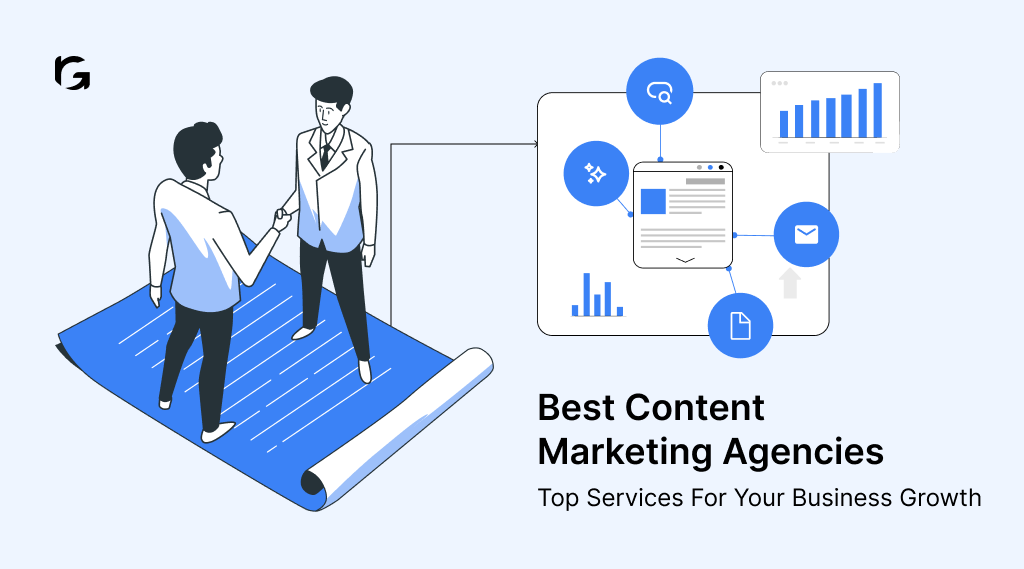

.png)
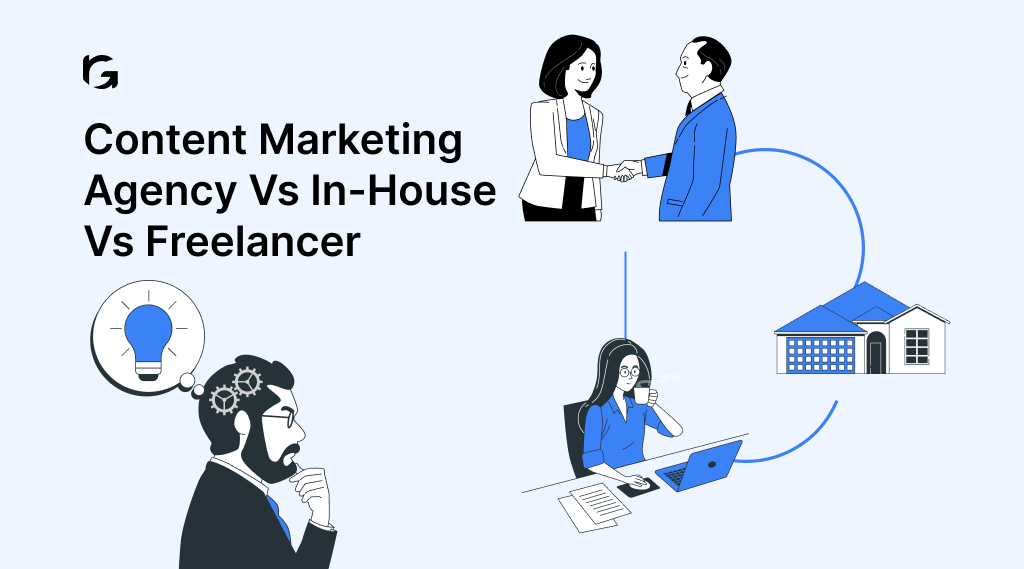
.webp)